Welcome back to This Week in Apps, the weekly TechCrunch series that recaps the latest in mobile OS news, mobile applications and the overall app economy.
The app industry continues to grow, with a record 218 billion downloads and $143 billion in global consumer spend in 2020. Consumers last year also spent 3.5 trillion minutes using apps on Android devices alone. And in the U.S., app usage surged ahead of the time spent watching live TV. Currently, the average American watches 3.7 hours of live TV per day, but now spends four hours per day on their mobile devices.
Apps aren’t just a way to pass idle hours — they’re also a big business. In 2019, mobile-first companies had a combined $544 billion valuation, 6.5x higher than those without a mobile focus. In 2020, investors poured $73 billion in capital into mobile companies — a figure that’s up 27% year-over-year.
This week was a busy one. Facebook held its developer conference F8 which delivered a lot of app-related news across its platform. Now, WWDC is just days away. We also broke a few big app stories this week, including one about TikTok’s privacy policy and its newly added permission to collect biometric data on U.S. users, including “faceprints and voiceprints.” Twitter added a subscription service, and Tinder tested group video chat.
And in our downloads section, we have a treat for readers: a time-sensitive and exclusive invite code to get into one of the hottest new apps for sneakerheads: Sole Retriever.
Get the This Week in Apps newsletter! Sign up here: techcrunch.com/newsletters
WWDC 21 Prep
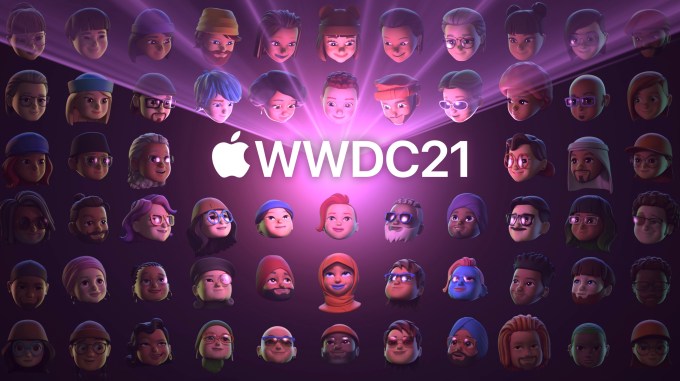
Image Credits: Apple
WWDC’s big keynote is kicking off next week on June 7 at 1 PM ET. The livestream page is here. While we may see new MacBook Pros, what software developers will care about are the forthcoming details about Apple’s latest OS releases and other new technologies. As to what they may include? Bloomberg reported that iOS 15 will introduce a way for users to set different notification preferences and automatic replies, based on their current status (driving, working, sleeping, etc.) and an updated Lock Screen where this menu of choices would be accessible. iMessage may be upgraded to be more social, to better compete with Messenger and WhatsApp. Meanwhile, iPadOS could be getting the App Library and an upgraded Home Screen with support for widgets. (And you can fill the screen with just widgets, if you choose.) Or who knows! Until it’s official, it’s all a maybe!
But one potentially interesting rumor to watch for would be a new privacy feature that would show users which apps were collecting data about them. This builds on Apple’s investments in App Tracking Transparency and could make it more difficult for shady SDKs to stay in business.
There will likely be some updates coming to other Apple’s own apps, Siri, watchOS and more. It’s going to be a packed week — stay tuned!
Ahead of WWDC, Apple also updated its report (conducted on its behalf via the Analysis Group) on App Store commerce. The company says the App Store facilitated $643 billion in billings and sales in 2020, up 24% from the $519 billion seen the year prior. It also noted that about 90% of the billings and sales facilitated by the App Store actually took place outside its walls, meaning Apple took no commission on those purchases. This is up from the 85% figure reported last year. The full report delves into other trends related to the pandemic’s impact, small and large businesses, and more. Apple initially commissioned the report to demonstrate how little business on the App Store is actually subject to App Store fees, but now it’s updated the report a year later. It’s interesting how much understanding Apple has about its App Store, especially when Tim Cook claimed to know so little about several crucial figures.
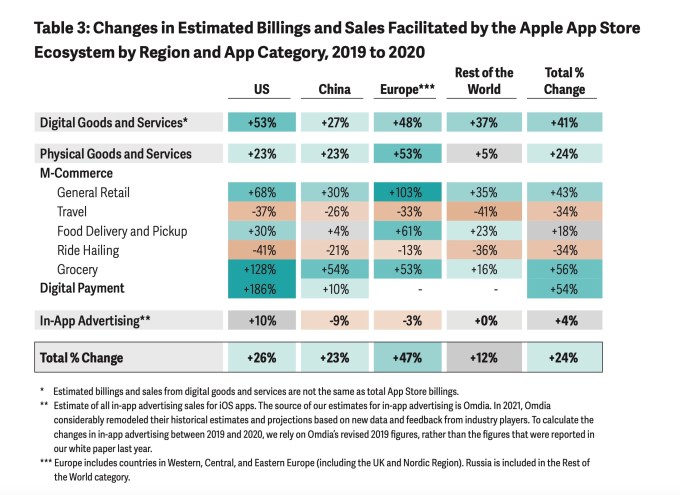
Image Credits: Apple
Apple also this week unveiled its 2021 Apple Design finalists. The awards honor apps and games that offer a combination of innovation, ingenuity and technical achievement — the latter which often means making great use of Apple technologies. The finalists span six categories: Inclusivity, Delight and Fun, Interaction, Social Impact, Visuals and Graphics, and Innovation.
Among the prospective winners are apps including snarky weather app Carrot Weather as well as the unique (Not Boring) Weather, short-form news service Brief, mental wellness app and Google Play award winner Loona, Editor’s Choice Genshin Impact, Snowman’s new kids app Pok Pok Playroom and summertime fun music app Poolside FM, and many others.
Weekly News
Platforms: Google
Google this week opened submissions for two of its annual developer programs: the Indie Games Accelerator and the Indie Games Festival. The programs are designed to help small games studios grow on Google Play. This year, the programs will include more eligible markets and will be fully digital experiences.
Google will restrict third-party apps from customizing the native Android Sharesheet in Android 12. Currently, the UI of the Sharesheet can differ from app to app, but XDA Developers reports it will become more iOS-like, by offering a consistent menu across apps.
Google is taking a cue from Apple by allowing users to opt out of personalization using the advertising ID in the Android Settings. Once users opt out, the advertising ID is disabled. The ID is a unique, user-resettable identifier provided by Google Play services. As part of a coming Google Play services update in late 2021, the advertising identifier will be removed when the user opts out of tracking, and any attempt to access the identifier will only return a string of zeros. Google says ad and analytics service partners will receive notifications about a user’s preferences to help them with compliance. The change will roll out in late 2021 and will impact apps running on Android 12 devices initially, with an expansion to devices that support Google Play in early 2022.
Platforms: Huawei (!!)
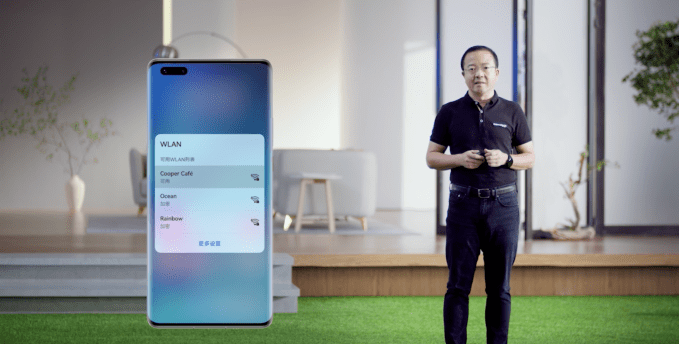
Image Credits: Wang Chenglu, president of Huawei Consumer Business Group’s software department
Two years after Huawei was put on a list of Chinese companies banned from doing business with U.S. organizations, it launched its proprietary operating system, HarmonyOS, for smartphones. The OS is designed to power phones, tablets and smart devices. Smartphone maker Meizu has already hinted it may adopt the new OS.
Augmented Reality

Image Credits: Facebook
Facebook’s flagship AR creation software, Spark AR, has already been used by more than 600,000 creators from over 190 countries to publish over 2 million AR effects. At Facebook’s F8 event this week, the company announced Multipeer API for video calls on Messenger, Instagram and Portal. The API will allow developers to create “shared AR” effects that apply to all the call participants — like a party hat that shows up on everyone’s heads for a birthday call, for instance.
E-commerce/Retail
Convenience store-style on-demand delivery startup JOKR launched in New York City to provide 15-minute or less delivery of items you might otherwise find in small stores and local delis. Except instead of dealing with stores, JOKR has its own strategically placed micro-hubs. The startup was founded by Ralf Wenzel, who previously founded Foodpanda, which later merged with Delivery Hero.
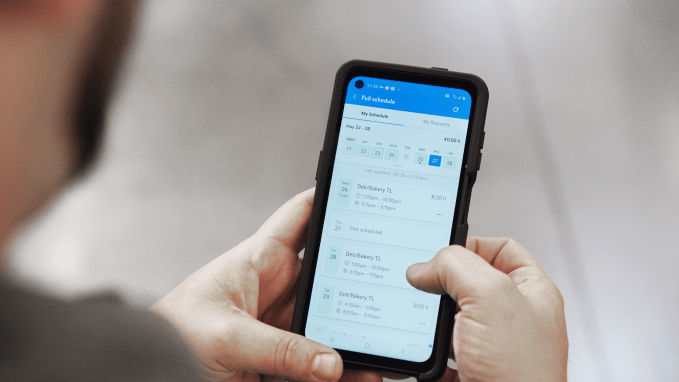
Image Credits: Walmart
Walmart is handing out over 740,000 new Samsung Galaxy XCover Pro smartphones (retail $499) to its employees, saying that “constant communication” is essential to its business. The phones will run Walmart’s proprietary Me@Walmart app, where employees clock in, adjust schedules, use the voice assistant “Ask Sam,” and communicate with others via push-to-talk. Employees will be allowed to use the phone for personal use after work hours, and Walmart will not have access to their personal data, the retailer says.
Fintech
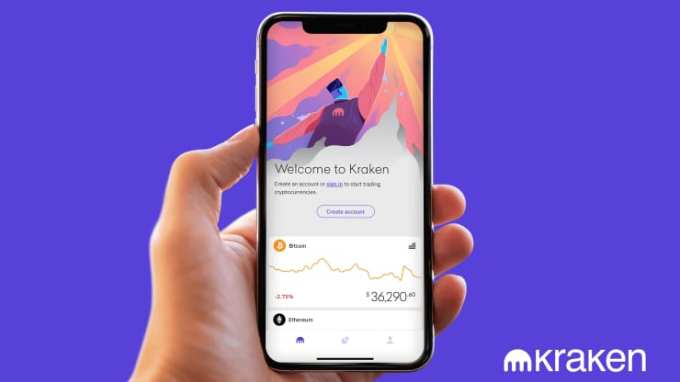
Image Credits: Kraken
Coinbase rival Kraken launched a mobile app in the U.S. that allows users to buy and sell more than 50 crypto tokens from their mobile phone. Kraken is the world’s fourth-largest digital currency exchange, in terms of trading volume.
Venmo now lets users hide their friend list for additional privacy. The change to the app came after BuzzFeed News found President Biden’s Venmo account using public friend lists. Digital rights groups had called the design a “security nightmare.”
Japan-based Line Corp. is launching its digital banking platform in Indonesia, which means it will now offering banking services in three of its biggest overseas markets: Indonesia, Thailand and Taiwan.
Coinbase Card, which allows users to spend their crypto while on the go, now works with Apple Pay and Google Pay. The card will offer up to 4% in crypto rewards for everyday purchases.
Chime has established itself as the No. 1 neobank in the U.S., according to eMarketer. The banking app will have 13.1 million U.S. accounts this year, up 30.7% from 2020. Current will have 4 million, double from the 2.1 million it had last year. Aspiration is in third place, with 3 million, followed by Varo, at 2.7 million.
Social
 Scoop: Tinder tested a group video chat feature ahead of parent company Match’s move into social discovery with its $1.73 billion acquisition of Seoul-based Hyperconnect. The feature was only tested briefly in New Zealand and then shut down, but may have served as a way to gain valuable data about younger users’ interest in social discovery apps and services as Match moves into that market which it says is double the size of the dating market.
Scoop: Tinder tested a group video chat feature ahead of parent company Match’s move into social discovery with its $1.73 billion acquisition of Seoul-based Hyperconnect. The feature was only tested briefly in New Zealand and then shut down, but may have served as a way to gain valuable data about younger users’ interest in social discovery apps and services as Match moves into that market which it says is double the size of the dating market.
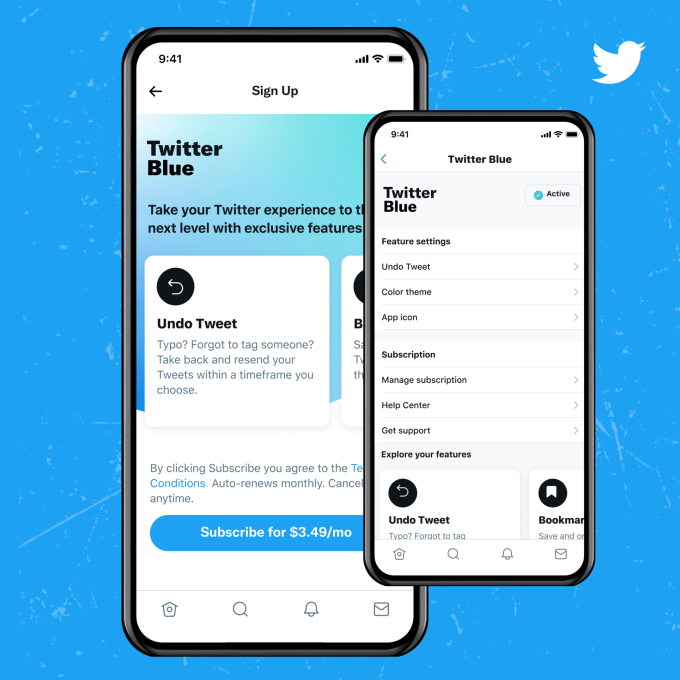
Image Credits: Twitter
Twitter Blue officially launched. Will you pay for better Twitter? Twitter’s new premium subscription brings tools to organize your bookmarks, read threads in a clutter-free format and take advantage of an “Undo Tweet” feature — which is the closest thing Twitter will have to the long-requested “Edit” button. It also offers a few other perks, like custom app icons, colorful themes and subscription customer support. Unfortunately, the service is only live in Canada and Australia for the time being.
Twitter redesigned its mobile app to put its Clubhouse rival, Twitter Spaces, in the middle of its navigation bar. Initially, only around 500 people from the original Spaces beta test will first see the new Spaces discovery tab, but it will expand to more people over time. The tab will help people keep track of Spaces they want to listen to and manage notifications, among other things.
Twitter began rolling out Birdwatch fact checks inside tweets. Birdwatch is Twitter’s pilot program that aims to crowdsource fact-checking of tweets, as an alternative to relying on fact-checkers. The program’s goal will be to append more info to misinformation online in real time.
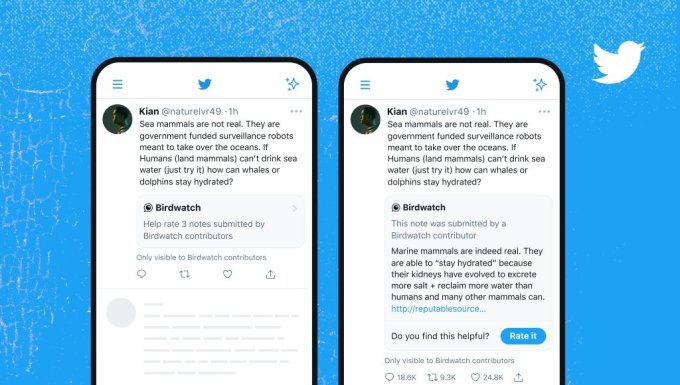
TikTok reamined the top non-game app worldwide in May 2021 by downloads. According to Sensor Tower, TikTok was No. 1 on both the App Store and Google Play with 80 million combined installs. Brazil accounted for 16% of those, and China 12%.
Facebook at its developer conference F8 also introduced Facebook Login Connect with Messenger. For businesses that have already integrated with Facebook Login, this allow users to log in to their app using their Facebook credentials and opt in to chat with businesses over Messenger, all in the Facebook Login flow. The tool is in closed beta.
Facebook also updated its Business Suite with a new feature that will allow developers to build “business apps,” which are tools made by third-party developers that work alongside the Business Suite. These “apps” could do things like bring in content from a catalog to their Facebook page or Instagram account. The platform already has 30 developers working on it and integrates with e-commerce platforms, like BigCommerce.
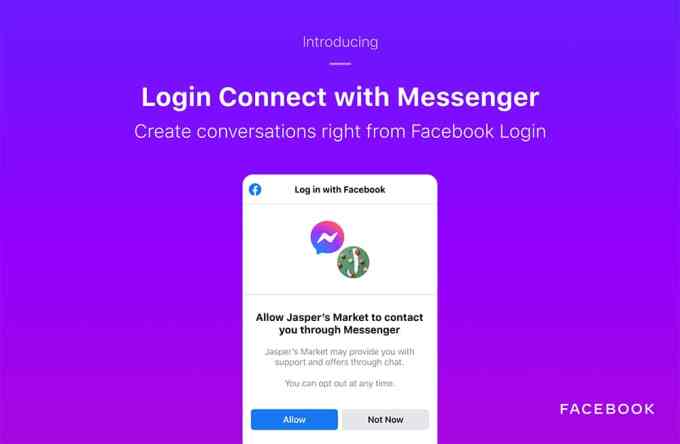
Image Credits: Facebook
Messaging
WhatsApp reversed course and now says it won’t reduce the app’s functionality if users don’t agree to its new privacy policy. The rollout had led to a lot of backlash as it revealed the messaging app would begin sharing more info with Facebook.
As part of its F8-related announcements, WhatsApp said it would update its Business API to make it quicker for business to get started with its service. WhatsApp will make it faster to set up a business account (5 minutes instead of weeks), and will allow businesses to respond faster to inbound messages, as well as send messages to users who opted in. The business tool for customer care will allow up to 10 pre-written messages, among other updates.
Facebook CEO Mark Zuckerberg told popular news outlet/leaker WaBetaInfo that WhatsApp will add multi-device support for connecting up to four devices to one account. He also said WhatsApp will introduce a “view once” disappearing feature for photos and videos, and is working on an iPad app. The method of delivering this news is worth noting — WaBetaInfo is not a traditional news outlet, but more of an independent news portal of sorts. Zuckerberg has been taking Facebook news to non-traditional (and often far friendlier) channels as of late, including popping up in Clubhouse rooms and other independent outlets. Facebook clearly feels mainstream press has turned on it when they…[checks notes]…held Facebook accountable for its actions.
Facebook also announced the general availability of the Messenger API for Instagram. First announced last fall and rolling out in phases, the API offers a more efficient way for larger brands to handle a high volume of messages by allowing them to integrate Instagram messaging into the tools and applications they’re already using in-house to manage their Facebook conversations.
Community social network Nextdoor launched a new feature called Free Finds that helps its users unload their unwanted stuff on others in their neighborhood. Notably, the feature doesn’t require you to be a Nextdoor member to access the listings, but eventually, those users may convert.
Streaming & Entertainment
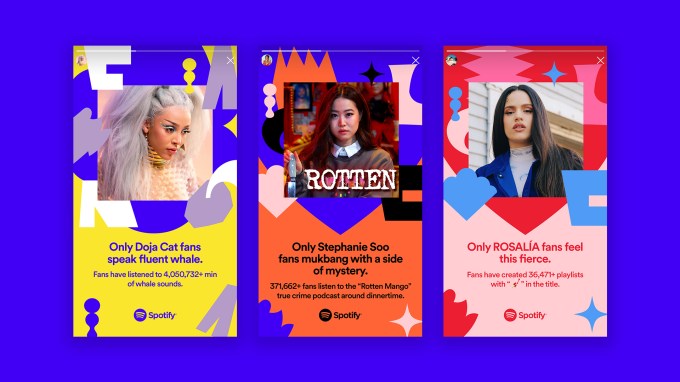
Image Credits: Spotify
Spotify rolled out a sort of mid-year version of Wrapped with the launch of the new personalized experience, Only You. The feature offers insights about your music history in a sharable format, like your musical dinner party or audio birth chart, and other fun finds. Why now? Perhaps Spotify is heading off Apple Music news to come with a feature that reminds users it does personalization best?
Spotify also added Blend, a way to create a playlist with any other Spotify user. The company offers a similar feature for users on its Family and Duo plans, but this new tool doesn’t require users to be in the same household.
Apple tried to acquire livestreaming music platform Verzuz, which later sold to video social network Triller, Bloomberg reported. Apple didn’t engage in a bidding war and offered a lower price than what Triller paid, it said.
The Apple TV app launched on Android devices. Like Apple Music, Apple TV is a service that needs to work across platforms in order to compete with rivals. The Android app’s arrival followed the Apple TV app’s debut on Nvidia’s Shield TV, which means it’s now available across all major Android TV-based devices.
Health & Fitness
Amazon updated its Halo health app with a new feature called Movement Health, which will use computer vision and machine learning to asses users’ posture, mobility and stability and then suggest exercises to improve them.
Peloton slashed the pricing for its fitness app, normally $12.99/mo, for students, teachers, healthcare workers and military. Students can pay $6.99/mo while the others can pay $9.99/mo. Military members and their families can lock in that rate for life. The company is facing a PR crisis after recalling treadmills that injured 70 and led to one infant death.
Utilities
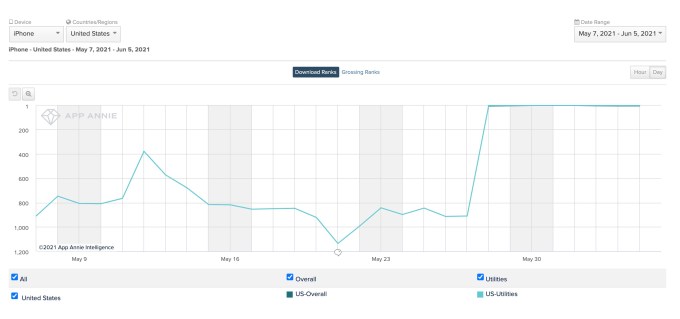
Image Credits: App Annie
A TikTok trend where users prank people by spamming them on text has driven the app that makes that possible, Paste Keyboard, to the top of the App Store. Mashable noted the app’s rise, but couldn’t figure out why. Nor could App Annie. It’s kids, y’all. Honestly, the App Store needs a new “viral” chart at this point.
AirTag support is coming to Android. Apple announced some changes to AirTag, including the period of time they’ll make a sound when moved. The time will change from three times per day to a random time between 8-24 hours. Apple believes the shortening of the window will serve as a better deterrent against bad actors using AirTag to track someone. Alongside this announcement, Apple said it will later this year launch an Android application that will allow users to detect AirTag or other Find My network-enabled accessories that are separated from its owner and may be traveling with a user.
Firefox revamped its Mac and iOS app this week with a what it claims is a more distraction-free design, featuring streamlined toolbar and menus, expanded privacy protections, a new look for tabs, updated notifications and alerts, easier muting, and more.
Ring added “Request for Assistance posts” on its Neighbors app, claiming this will allow public safety agencies (e.g. police) to ask communities for help in investigations. The Request for Assistance posts can only be issued from verified public safety agency profiles, Ring says. Of course, this isn’t the only way police can acquire Ring videos, as the company has many police partnerships across the U.S. that let them acquire footage without a warrant.
Auto/Transportation
Toyota added a data privacy portal to its apps. The feature is available in the Account Settings of the Toyota and Lexus apps and works with vehicles offering connected services that were built in the 2013 model year or later. It also allows consumers who own multiple Toyota or Lexus vehicles to customize privacy and data-sharing settings for each.
Gokada is launching its ride-hailing service in two more Nigerian cities as part of its super app plans. The company is merging its ride-hailing service with food delivery platform GShop. In the past year, Gokada crossed $100 million in annualized transaction value, and helped onboard 30,000 merchants.
Reading
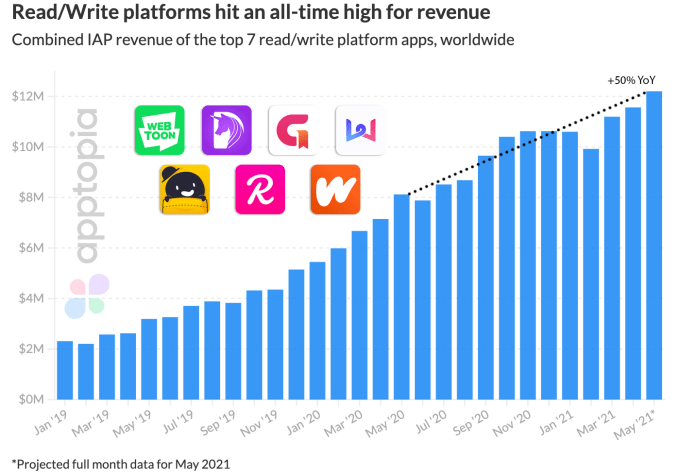
Image Credits: Apptopia
The top reading and writing apps grew their IAP revenue 50% YoY in May 2021, Apptopia reported. This group includes apps for writing novels or comic books, or reading the works from others, like Webtoon, Wattpad, Dreame, GoodNovel, Webnovel, Tapas and Radish. As a grouping, these apps have also grown IAP revenue 15% over the past six months. Since January 2020, Webtoon and Dreame combined accounted for 56.3% of the grouping’s total IAP revenue.
Government & Policy
Google, Facebook, WhatsApp, Telegram, LinkedIn and startups ShareChat and Koo have now either fully or partially complied with India’s IT rules that require them to appoint and share contact details of representatives tasked with compliance, nodal point of reference and grievance redressals to address on-ground concerns. Twitter, whose offices were raided by police in Delhi, has not yet complied.
EU will review TikTok’s Terms of Service following child safety complaints. Areas of concern include hidden marketing, aggressive advertising techniques targeted at children and contractual terms in the company’s policies that could be misleading or confusing for consumers.
Security & Privacy
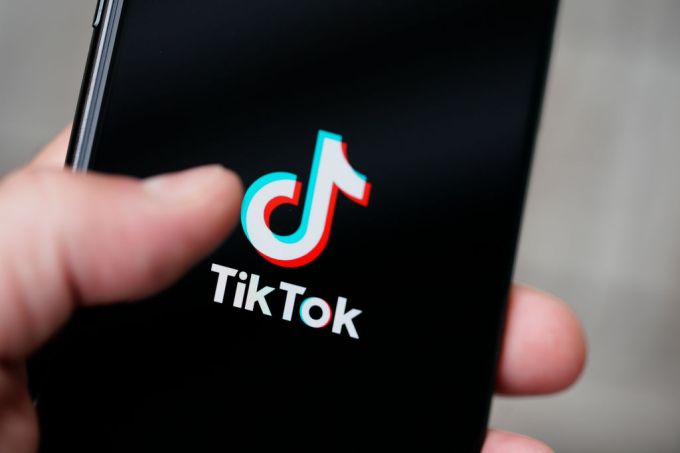
The TikTok logo is seen on an iPhone 11 Pro max
 Scoop: TikTok just gave itself permission to collect biometric data on U.S. users, including “faceprints and voiceprints.” A change to TikTok’s U.S. privacy policy on Wednesday introduced a new section that says the social video app “may collect biometric identifiers and biometric information” from its users’ content, including things like “faceprints and voiceprints.” Reached for comment, TikTok could not confirm what product developments necessitated the addition of biometric data to its list of disclosures about the information it automatically collects from users, but said it would ask for consent in the case such data collection practices began.
Scoop: TikTok just gave itself permission to collect biometric data on U.S. users, including “faceprints and voiceprints.” A change to TikTok’s U.S. privacy policy on Wednesday introduced a new section that says the social video app “may collect biometric identifiers and biometric information” from its users’ content, including things like “faceprints and voiceprints.” Reached for comment, TikTok could not confirm what product developments necessitated the addition of biometric data to its list of disclosures about the information it automatically collects from users, but said it would ask for consent in the case such data collection practices began.
The biometric data collection details were introduced in the newly added section, “Image and Audio Information,” found under the heading of “Information we collect automatically” in the policy.
Alibaba’s UC Browser app has been found to be harvesting the private web activity of users across Android or iOS when incognito mode is turned on. The browser is the fourth largest in the world, with 500 million Android downloads alone. Before being banned in India over security concerns related to Chinese apps, it was also one of the most popular in India, as well.
Funding and M&A
 Miami-based NUE Life Health raised $3.3 million for its telemedicine platform and app in the U.S., where it combines mental wellness solutions that employ psychedelic-assisted therapies with a graph database-driven app. The app was backed by investors who recently left SV for Miami, including Jack Abraham, Shervin Pishevar, Martin Varsavsky, Jon Oringer, James Bailey and Christina Getty.
Miami-based NUE Life Health raised $3.3 million for its telemedicine platform and app in the U.S., where it combines mental wellness solutions that employ psychedelic-assisted therapies with a graph database-driven app. The app was backed by investors who recently left SV for Miami, including Jack Abraham, Shervin Pishevar, Martin Varsavsky, Jon Oringer, James Bailey and Christina Getty.
 Etsy acquired secondhand e-commerce startup Depop for more than $1.6 billion. Depop, which caters to a Gen Z crowd, saw 2020 gross merchandise sales and revenue of approximately $650 million and $70 million, respectively.
Etsy acquired secondhand e-commerce startup Depop for more than $1.6 billion. Depop, which caters to a Gen Z crowd, saw 2020 gross merchandise sales and revenue of approximately $650 million and $70 million, respectively.
 Social network platform Venn raised $60 million in Series B funding led by Group 11. The startup provides technology that allows building owners and other real estate partners and communities to provide social networking services to their tenants, with tools for organizing buy/sell groups, organizing community activities, connecting with neighbors and more.
Social network platform Venn raised $60 million in Series B funding led by Group 11. The startup provides technology that allows building owners and other real estate partners and communities to provide social networking services to their tenants, with tools for organizing buy/sell groups, organizing community activities, connecting with neighbors and more.
 Digital health management company Hello Heart raised $45 million Series C led by IVP. The company’s app is marketed by employers as part of their benefit programs and helps patients manage heart health and blood pressure, medications and more.
Digital health management company Hello Heart raised $45 million Series C led by IVP. The company’s app is marketed by employers as part of their benefit programs and helps patients manage heart health and blood pressure, medications and more.
 Personal finance app Truebill raised $17 million in Series C funding led by Accel, valuing the business at $500 million. The app helps consumers get better control over their finances by helping them cancel subscriptions, negotiate bills, view credit reports, budget, and access spending insights, among other things.
Personal finance app Truebill raised $17 million in Series C funding led by Accel, valuing the business at $500 million. The app helps consumers get better control over their finances by helping them cancel subscriptions, negotiate bills, view credit reports, budget, and access spending insights, among other things.
 Newly launched stock trading app Lightyear disclosed it raised $1.5 million pre-seed funding in a round co-led by the new unnamed fund formed by Wise co-founder Taavet Hinrikus and Teleport co-founder Sten Tamkivi. The app was the fund’s first investment.
Newly launched stock trading app Lightyear disclosed it raised $1.5 million pre-seed funding in a round co-led by the new unnamed fund formed by Wise co-founder Taavet Hinrikus and Teleport co-founder Sten Tamkivi. The app was the fund’s first investment.
 Istanbul-based grocery delivery app Getir raised $550 million in new funding, tripling its valuation to $7.5 billion. New investors include DisruptAD and Mubadala Funding Firm (both being arms of Abu Dhabi sovereign wealth funds) as well as Silicon Valley-based Silver Lake.
Istanbul-based grocery delivery app Getir raised $550 million in new funding, tripling its valuation to $7.5 billion. New investors include DisruptAD and Mubadala Funding Firm (both being arms of Abu Dhabi sovereign wealth funds) as well as Silicon Valley-based Silver Lake.
Downloads
Sole Retriever
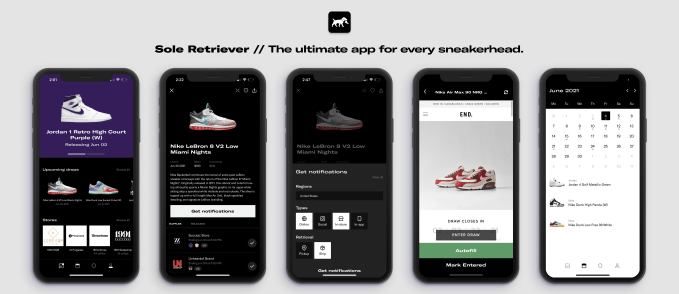
Image Credits: Sole Retriever
Sole Retriever is a newly launched app that aims to be a sneakerhead’s dream.
The app offers a one-stop shop for all things sneaker — including sneaker news, sneaker releases, sneaker raffles, a calendar of upcoming drops and more. The company says its goal is to democratize access to sneaker drops by making this info more accessible and convenient for consumers. Before its mobile launch, Sole Retriever had offered its service via the web only. Now it’s live on both iOS and Android.
Unique to the mobile experience is the ability to customize your alerts so you only hear about the raffles you want to know about — like those in the U.S., or only those that are in-store or online, for example. It also makes entering raffles easier with autofill features. Custom profiles that let you save the info for others who have agreed to let you enter their name and address to increase your chances of winning. And the app can save your logins for different retailers to make shopping easier.
Sole Retriever is currently only available as a waitlist, but TechCrunch readers can bypass the waitlist! Here’s how!
After downloading the app and logging in, when you reach the waitlist screen, you can redeem a special code — “TWIA” (in all caps!), which lets you bypass the entire waitlist and gain instant access to start your seven-day free trial for the app. The code is only valid for 24 hours after this post goes live so hit it quickly!
Apple Developer app
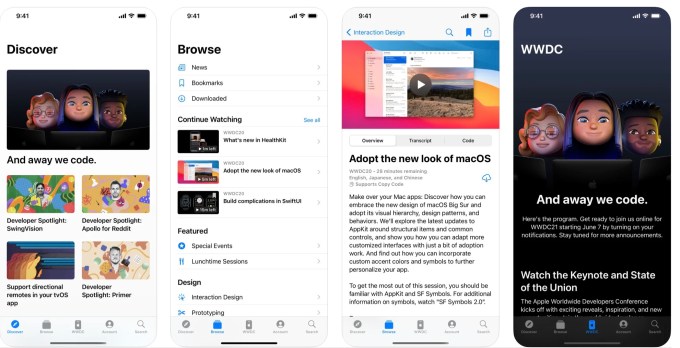
Image Credits: Apple
The Apple Developer app is not new. But it is the must-have download for the week ahead, as it will provide mobile developers with access to everything needed to navigate WWDC 21’s all-digital event. The app was updated this week with details about the agenda, sessions, pavilions, labs, coding and design challenges, and more. Developers can also sign up for labs inside the app and get notifications about their appointments. There are also new WWDC 21 iMessage stickers for some added fun.
Reading Recommendations
- Marco.org: Developer Relations. Marco Arment has some harsh words for Apple ahead of WWDC. He accuses the iPhone maker of undervaluing what apps mean for iOS beyond their IAP revenue. And he points out that developers themselves bring in a good number of customers through their own marketing efforts, not because of their App Store listing.
- Pew Research: Mobile Technology and Home Broadband 2021. Pew takes a look at U.S. trends, including smartphone ownership adoption. Eighty-five percent of U.S. adults now own a smartphone, which is more than have broadband (77%) at home.
- Donny Wals: The iOS Developer’s Guide to WWDC 2021. Wals reminds developers to not get caught up in the WWDC chaos, pace themselves and focus on what matters to their business. He also makes suggestions about what to not overlook during WWDC week.














0 comments
Post a Comment